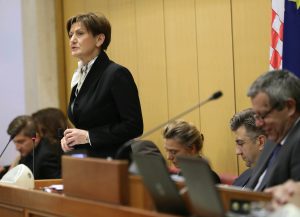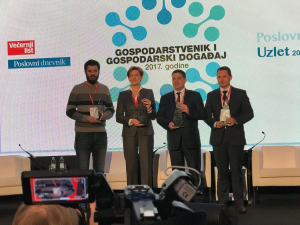At a government level, we are implementing measures that facilitate permanent and stable growth. Probably the most important economic reform since Croatia’s independence is implementation of the Law on the Extraordinary Administration in Trade Companies
Owing to a fast and determined action by the government, the crisis in Agrokor did not spill over into other companies that operate under that concern, and, as a result, Croatia got one of the most important laws that facilitates legislative and institutional framework for systemic risk management, says Martina Dalić, Deputy Prime Minister and Minister of Economy, Entrepreneurship and Crafts for Diplomacy&Commerce magazine. Additionally, the government adopted a series of measures to alleviate the economy, and, in the next two years, will continue to systemically eliminate the obstacles to economic growth, entrepreneurship and innovation.

From your position of the Deputy Prime Minister and from the government’s perspective, how would rate 2017? What would you single out as best developments, and what would you have done differently?
In terms of economy, 2017 was a very challenging year, and also the year in which we built a firm foundation for permanent and stable growth. We also had favourable macroeconomic developments which resulted in the 3% growth of the Croatian economy in the first three quarters. By implementing a responsible fiscal policy, we have managed to step out of the excessive deficit procedure, and have recorded a drop in the overall deficit and public debt, as well as a drop in its share in the national GDP. Furthermore, due to the economic recovery and the positive economic environment, unemployment has been declining. This year, the government gave a strong impetus to stable economic growth and the future. We have made a very first step towards introducing euro as the official currency in the Republic of Croatia, and, together with the Croatian National Bank, we have drafted a strategy for introduction of euro which, among other things, contains a detailed cost and benefit analysis, which, in turn, has launched a public debate about this strategic goal of our government.
All of this unfolded in a very challenging environment brought on by the crisis in Agrokor which has revealed substantial obstacles in functioning of market mechanisms, and which was a result of the way the company has been operating. There was a threat of the entire crisis spilling over into a substantial segment of the Croatian economy, but the government reacted swiftly and decisively by creating a legal framework which established a new bankruptcy format applicable to companies that are of systemic importance to the Republic of Croatia.

The government has decided to increase minimum wage and plans to increase pensions, there are also measures that are supposed to alleviate a potential negative effect on the competitiveness of the Croatian industry. How are they going to be implemented in practice?
This is a set of measures that will benefit both employees and employers. On one side, and with the aim of protecting the most vulnerable employee groups, we have decided to raise the minimum wage to 3,439 kunas, i.e. by 5%, for the second consecutive year, and clearly regulated that the minimum wage raise does not include compensation for overtime and for working nights, Sundays, holidays, or on any other day that the law stipulates as a non-working day, which did happen in the practice in the past. On the other hand, we exempted employers from paying some of the contributions on minimum wages, and thus cut back on labour cost by 103.85 kunas, which has directly contributed to a higher competitiveness of industry. Additionally, and in order to deal with the lack of workforce in Croatia, we raised employment quotas for foreigners for next year to 31,000 work permits.
In the beginning of next year, we are going to start implementing a series of tax amendments in order to regulate the meal, accommodation and beverage allowances for permanent seasonal workers as untaxed expenses for employers. We are also going to raise the untaxed gift limit from 400 to 600 kunas.
The government aims at improving the doing business climate with the newest economic policy measures, and primarily with the tax reform, the Law on Public Procurement and the Law on Public Investments. What are the most important novelties in tax reform, the Law on Public Procurement and Law on Public Investments?
The government has put the improvement of the business and investment climate at the heart of its programme of activities, and approaches this issue in a wide range of areas. Thus, with a comprehensive tax reform, we have created a stable, sustainable and simple tax system which implies tax reliefs for both citizens and employers, and we have also contributed to boosting the economy’s competitiveness.
By reducing the corporate tax rate from 20% to 18%, and to 12% for entrepreneurs who generate annual revenue of up to HRK 3 million, we have freed up funds for entrepreneurs so they can further develop and invest in new projects and jobs. Additionally, by increasing the threshold for entry into the VAT system to 300,000 kunas, we have made it easier for small businesses to do business with fewer administrative costs. The tax reform has also contributed to social justice through changes in the income tax system. Thus, the amount of personal allowance has been increased, with changes in tax rates and grades – the three rates of 12%, 25% and 40% are now replaced with two rates of 24% and 36%. In this way, we created a tax relief for workers, boosted the competitiveness and managed to keep highly qualified workers in the country. Thanks to the new Law on Public Procurement, we have improved the procurement process and increased its transparency. Owing to three new laws, we have further improved the investment climate. These are the Law on Strategic Investments that eliminates the flaws in the existing legislature, reduces the value of projects that are considered strategic, and expedites the process of obtaining general documentation for the project implementation. Amendments to the Law on Investment Promotion create more favourable conditions for realization of investment projects, especially for micro entrepreneurs, ICT projects, logistics and distribution centres, as well as for investments implemented through the activation of inactive state assets. Amendments to the Law on Improvement of Entrepreneurial Infrastructure will now incorporate free zones into the entrepreneurial infrastructure system.

Innovation and development of innovation-conducive environment are some of the most important issues for the future of the Croatian economy. What are you going to do regarding these areas?
Promoting innovation and investments in research and technological development, and above all, the commercialization of innovative solutions, are the key factors in raising productivity and competitiveness of the Croatian economy. The public sector is supposed to play crucial role in this through acquisition of innovative products and solutions and by supporting the creation of an innovation-conducive environment. Which is why our new Law on Public Procurement stipulates a special public procurement procedure called ‘Partnership for Innovation’ as a strong tool for promoting innovation and development of innovative goods, services and works. The new Law on State Support for Research and Development Projects, that we have drafted, will facilitate bigger investments by private sector in research and development thanks to income and corporate tax reliefs. We are going to provide additional incentives for innovation projects through the EU funds where we have 500 million EUR at our disposal.
The Action Plan for Administrative Alleviation of Economy is the first step in reforming the business environment. How much have you progressed with this, and what else needs to be done in that area?
The Action Plan for Administrative Alleviation of Economy, which we adopted at the end of last year, includes 104 measures, of which 74 are already being implemented or are in the final phase of implementation through the pending adoption of laws. The remaining measures will be implemented early next year. Our estimates show that the measures that have been implemented so far have created enough room for saving around 700 million kunas by eliminating some of the administrative obligations and, most importantly, by saving time through streamlining procedures. Given that the current
Action Plan covers 8 areas, we are currently carrying out a comprehensive SCM measurement of the administrative burdens on the economy in more than 40 regulatory areas which have an impact on our economy. Based on the measurement results, we will create new action plans for 2018 and 2019 with the aim of reducing the excessive administrative costs for the business sector by at least 30% of the measured costs per area by the end of 2019.
Many people say that implementing the Law on the Extraordinary Administration in Trade Companies is the economic event of the year. How important is this for future situations?
I think that it is the most important economic reform since Croatia’s independence. The crisis in Agrokor highlighted the vulnerability of the Croatian economy and the obstacles in functioning of the market mechanisms. By recognizing the inadequacies in the legal framework in cases where systemically important trade companies are facing pre-bankruptcy or bankruptcy issues, the Government has managed to act in a timely, decisive and effective manner in order to ensure and improve financial stability of the entire economy thus devising a bankruptcy procedure that ensures stabilization of company operations and financial, business and ownership restructuring of the systemically important trading companies. The activation of the extraordinary administration procedure by the then Agrokor’s administration and the implementation of the extraordinary administration procedure have resulted in normalization of operations, regular payments and re-instigated trust in the company itself, thus preventing chaotic restructuring of the company and stopping the crisis from spilling over into a significant part of the Croatian economy which would have had unforeseeable consequences for jobs and the economy as a whole.
How much money from the EU funds can Croatia count on in the next year and years after that, and what are the opportunties and limitations in funding the entrepreneurial sector? How can these funds improve investment environment?
We have 1.25 billion EUR at our disposal under the current financial budget for entrepreneurial development projects, improvement of entrepreneurial infrastructure and innovation, research and development projects. With this amount in mind, we have so far launched a total of 18 calls for submission of project proposals valued at 627 million EUR out of which 11 are directly intendend for entrepreneurs while other calls are aimed at enhancing entrepreneurial infrastructure and indirectly at entrepreneurs through creating a favourable entrepreneurial environment.
By the end of 2017 and 2018, we will have launched 12 new calls for submission of project proposals worth between 200 and 267 million EUR for development of new products and services resulting from research and development activities, development of production capacities of small and medium-sized enterprises, standards and certificates, implementation of quality trademarks, implementation of ICT technology, and internationalization of business. During 2019 and 2020, we will launch calls worth about 100 million EUR.
It is also important to point out that, by allocating grants, we are spending funds through financial instruments that provide entrepreneurs with more favourable funding conditions at lower interest rates and a with fewer insurance instruments. We have 284 million EUR available for this purpose. I believe that the money from the EU funds contributes to improving the investment environment both in terms of bettering the entrepreneurial infrastructure and thus the overall business environment, as well as from the aspect of creating direct support to entrepreneurs which, in turn, encourages new investments and creates new jobs.
How would you interpret the conclusions and recommendations from the FIC in Croatia contained in the White Book? What is your message to foreign and domicile investors?
I welcome the initiative of the FIC and I am pleased to see that the areas that are highlighted in the White Book, coincide with the priorities of this government. A more favourable business and investment environment is one of the main pillars of this government’s policy that has already implemented a number of measures in this direction – from tax reforms to the initiated administrative alleviation of the economy, the reduction of non-tax duties, the establishment of a system for assessing the effects of laws and regulations on small and medium enterprises, a more vigorous use of the EU funds, the implementation of financial instruments, the development of the innovation-conducive environment, and the improvement of the legislative framework to stimulate investments in Croatia. Furthermore, we will work on strengthening our institutions to ensure greater efficiency and expeditiousness of the work done by the administration and the courts.
Could you tell us what are you the most proud of personally and in the Ministry that you helm?
I would definitely like to single out the adoption of the Law on the Extraordinary Administration in Trade Companies that are of systemic importance to the Republic of Croatia. I am glad that our efforts had been recognized and that this law was recently declared the economic event of the year due to the fact that we have just launched one of the largest and most important reforms in the Croatian economy, and demonstrated that this Government has a timely, determined and effective approach to any issue, including the biggest ones. Likewise, I am proud of the fact that we have launched a series of measures for entrepreneurs and for creating a more favourable business environment. I am primarily referring to the regulatory reform that we are pursuing in order to alleviate the economy from many administrative obligations and unnecessary procedures, as well as to a set of investment and innovation laws that we have developed, which will contribute to the improvement of the investment and innovation environment in Croatia.